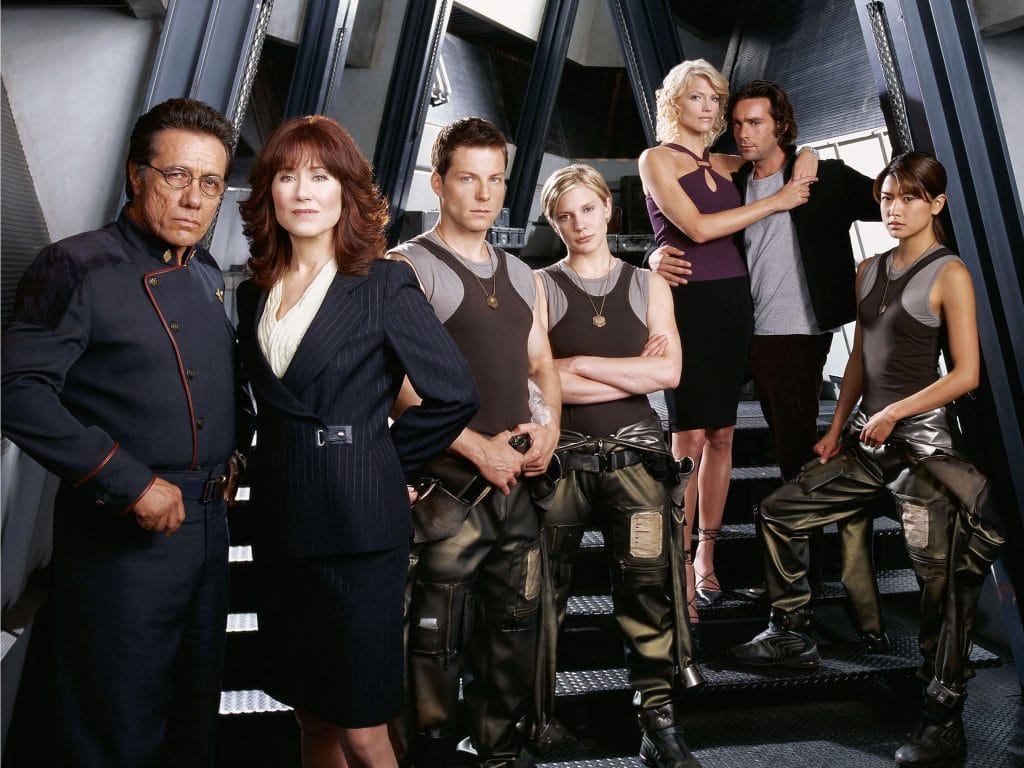I think a lot about the stars. While my wife has the gift of faith, I joke that I have the gift of skepticism. But as skeptical as I am, I just know there is something bigger than me out there in the universe. Science fiction knows it too. They just often present the transcendent as a machine.
Ad Astra was a beautiful film that used a science fiction backdrop to wrestle with big themes like fathers, doubt, hope, a search for meaning, and the quest to find something greater than us in the universe.
And there are many other films or shows that grapple with spiritual themes or wrestle with the existence of God: Do Androids Dream of Electric Sheep?, Firefly, Star Wars, Stargate, The 100, Prometheus, 2001: A Space Odyssey …you know, it might be easier to list science fiction properties that don’t delve into themes of transcendence.
But nothing does a better job than Battlestar Galactica when it comes to the search for God among the stars. When Battlestar creator Russel D Moore was asked about the meaning of God in the show, he had this to say:
“I’m an agnostic in the truest sense of the word. I think about these things — I grew up Roman Catholic, I’ve been interested in Hinduism, in Eastern religions, but I’m not dedicated to anything — I go through periods where I think maybe it’s all nonsense; maybe it’s the Matrix…I’m open to various ideas. And I think the show has been a lot about exploration of ideas, and the basis of faith and how can you come at it: one God, many gods, no gods, who knows.”
Perhaps it is Moore’s doubt that makes the spirituality of Battlestar Galactica so engaging. And perhaps no other character arc illustrates a movement from doubt to faith better than Gaius Baltar’s.

Baltar is initially skeptical of all religion, yet is converted to the “One True God” though the persuasion of Six, ultimately coming to the conclusion that he is The Hand of God. Baltar is far from devout and his path to faith is windy and rocky, which is perhaps what makes it compelling to so many viewers.
Through heavy-handed imagery like the Twelve Colonies and frequent themes of miraculous, divine intervention, Battlestar Galactica leaves no room for doubt: There is a God in the stars and it is both fully divine and fully…a machine.
I don’t want to say much more about Battlestar Galactica. It’s incredible television, so I want to encourage you to watch it if you haven’t.
The Off-Planet Church
But I’m still thinking about the stars, particularly in 2020, when most of us are itching to get off this rock, if just to find a planet that is more hospitable to humans and doesn’t have Twitter.
Thomas K. Hoffmann is thinking about God among the stars as well. In fact, he’s written a framework for developing a church off-planet. Explains Hoffman: As governments and corporations engage space exploration and colonization, the Christian Church will not be far behind. The Church has historically always been part of the first waves of explorers and colonizers, with its ideological interests being easily supported by generous resources and strong infrastructures.
But a space exploring Church would need to be friendly to guests, explains Hoffman. So his beginning framework – built with three common religious planks, namely, exomissiological theology, ecclesiology that emphasizes religious health, and church worker vocation – represents one way of insuring an appropriate presence in space for the Church.
I must warn you that Hoffman’s framework runs counter to the will of the Cylons though. Hoffman outlines firm guardrails against a “dominion theology” that has its roots in Manifest Destiny and seeks to place all locations and creatures in the universe under the rule of the “One True God.”
It’s important to be neighbors, not conquerers, in other words. Perhaps we need a reboot of Battlestar Galactica to explore those themes.

